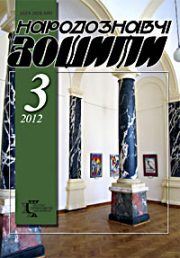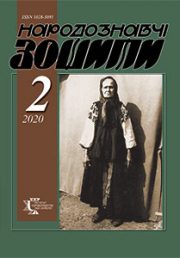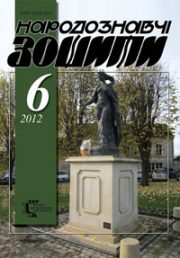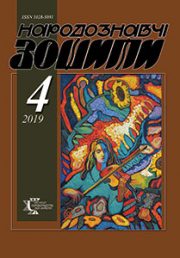The Ethnology Notebooks. 2023. № 4 (172), 832—840
UDK [39:061.2:001](477)”189/193″:930.25
DOI https://doi.org/10.15407/nz2023.04.832
FOLKLORE STUDIES IN THE ETHNOGRAPHIC COMMISSION OF NTSH: HISTORY AND PRESENT
SOKIL Нanna
- ORCID ID: https://orcid.org/0000-0002-8352-2124
- Doctor of Philological Sciences, professor,
- Ivan Franko National University of Lviv,
- 1, Universytetska Street, 79000, Lviv, Ukraine,
- Contacts: e-mail: gan.sokil@gmail.com
Abstract. The article summarizes the main directions of folklore activity of the Ethnographic Commission (1898—1939), reveals the conceptual foundations of Ukrainian folklore studies in the late XIX — early XX century. The organizational role of the Shevchenko Scientific Society Ethnographic Commission in the formation and approval of scientific approaches, systematic research work is emphasized. In the context of the Society’s activities, the importance of prominent representatives — Ivan Franko, Mykhailo Hrushevsky, Volodymyr Hnatiuk as initiators of folklore work — is highlighted.
At the present stage in the period of resumption of the activities of the Scientific Society of T. Shevchenko issues the development of Ukrainian science remain relevant. The object of research is the history of folklore, in particular the activities of a special commission in the field of this science, the subject is the interpretation of achievements during the period of active work of the Shevchenko Scientific Society. The purpose of the proposed article is to summarize and analyze the scientific-theoretical and publishing work of the Ethnographic Commission, to show the continuum and continuation of its activities at the present stage of development. Emphasis is placed on publications that have become classics of Ukrainian folklore. In the context of modern challenges, the vision and prospects of solving problems in the future are designed.
The material for the article was published monographs, collections, as well as reference books and archival materials. The research methodology is based on the complex involvement of various methods, principles and concepts.
Keywords: Scientific Society. Shevchenko, Ethnographic Commission of the Shevchenko Scientific Society, section of folklore, generalization, systematization, scientific principles, publishing activity.
Received 19.07.2023
REFERENCES
- Yatsenko, M.T. (1964). Volodymyr Hnatiuk. Life and folkloristic activity. Kyiv [in Ukrainian].
- Berezovsky, I.P. (1993). Folkloristics Ukrainian. Eastern Slavic folklore: Dictionary of scientific and folk terminology. Minsk: Science and Technology [in Bilorusian]
- Moroz, M. (1998). Materials for the chronology of the activity of the National Academy of Sciences (1873—1944). From the history of the Shevchenko Scientific Society. A collection of reports and announcements of scientific sessions and conferences of the National Academy of Sciences in Lviv (P. 266) [in Ukrainian].
- (1894). Meeting of the philological section. Star, 24 [in Ukrainian].
- Wynar, L. (1970). Mykhailo Hrushevsky and Scientific Society named after T. Shevchenko (1892—1930). Munich [in Ukrainian].
- Kyrchiv, R. (2005). Folkloristics in the scientific activity of Ivan Franko. Notes of NTSH. Proceedings of the philological section (Vol. 250, p. 360). Lviv [in Ukrainian]; Hrytsa, S. (2007). Ukrainian folkloristics of the 19th and early 20th centuries and musical folklore. Kyiv; Ternopil: Aston [in Ukrainian].
- Central Institute of Ukraine in Lviv. F. 309. Spr. 42. Ark. 20 [in Ukrainian].
- Hrushevsky, M. (1900). The previous development of the Scientific Society named after T. Shevchenko. Chronicle of the National Academy of Sciences (Part 1, p. 13). Lviv [in Ukrainian].
- (1898.). Notes of NTSH (Vol. 25, book 5: Chronicle and bibliography) [in Ukrainian].
- Hnatiuk, V. (1923). Shevchenko Scientific Society (P. 50). Lviv [in Ukrainian].
- (1900). Activities of sections and scientific commissions of the Societies. Chronicle of NTSH (P. 27) [in Ukrainian].
- (1907). Activities of sections. Chronicle of NTSH (Part 32, p. 15) [in Ukrainian].
- The book of minutes of the meetings of the members of the Ethnographic Commission for 1914—1943. TsDIA in Lviv. F. 309. Op. 1. Ref. 746 [in Ukrainian].
- Sokil, G. (2011). Ukrainian folkloristics in Galicia at the end of the 19th — the first third of the 20 th century: historical and theoretical discourse. Lviv [in Ukrainian].
- Kyrchiv, R. (1992). Development of theoretical foundations of Ukrainian folkloristics. Scientific Society named after T. Shevchenko and Ukrainian national revival: coll. of science works and materials of the first scientific session of the National Academy of Sciences (Lviv. March, 1990): reports, messages, materials (P. 147—152). Lviv [in Ukrainian].







